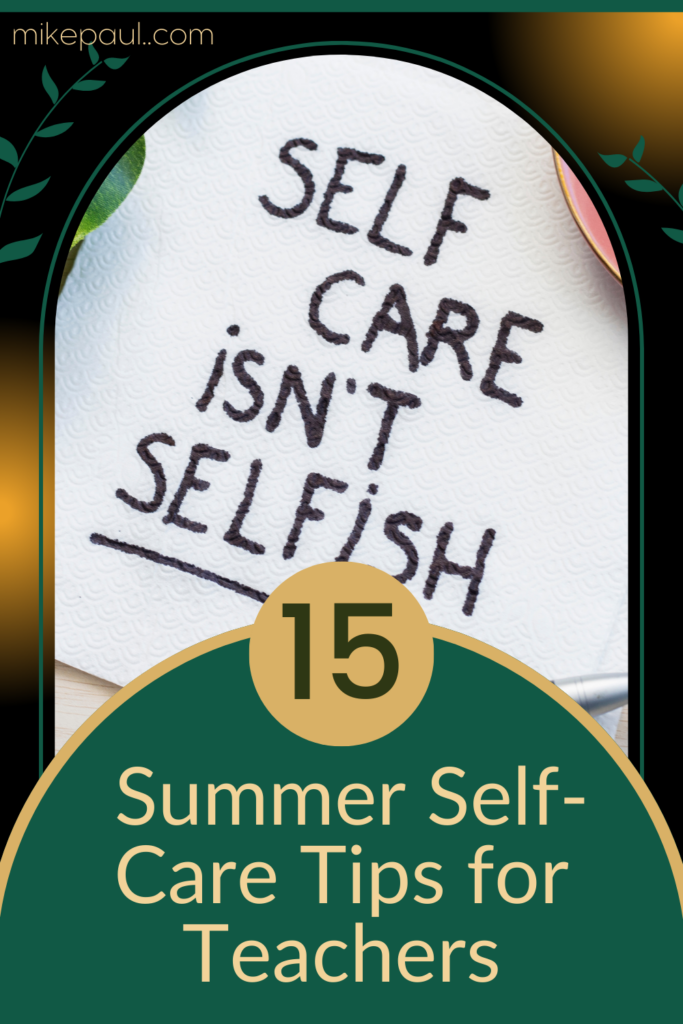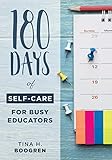
Teaching is both a demanding and rewarding profession. Even before the onslaught of COVID-19, teaching was incredibly demanding. Now that we’re in the post-COVID world, teaching is even more difficult.
Face it; you need a break.
As the school year comes to an end, it’s important to recognize the hard work and dedication that all teachers put into their jobs. You all spend countless hours preparing lesson plans, grading assignments, and supporting students. Despite facing many challenges, teachers persevere and continue to make a difference in the lives of their students. Taking a well-deserved break to recharge and prepare for the next school year is crucial.
Here are a few ideas to help you get the most out of your summer break, resting and recharging before the new school year:
1. Set Boundaries
Just as you set boundaries in the classroom, it’s essential to establish boundaries between your professional and personal life. Turn off email notifications after work hours, and use your free time to focus on your interests.
- Tina H. Boogren (Author)
- English (Publication Language)
- 176 Pages – 09/20/2019 (Publication Date) – Solution Tree Press (Publisher)
2. Unwind with a Book
Summer is the perfect time to delve into that book you’ve been meaning to read. Reading is an excellent way to exercise your mind, expand your vocabulary, and gain new knowledge. Whether you prefer fiction or non-fiction, there is a book out there for everyone. If you’re not sure where to start, consider exploring different genres such as mystery, science fiction, or romance. Reading also has the added benefit of reducing stress, as it allows you to escape into a different world and forget about your worries for a while. So, take advantage of the warm weather and find a cozy spot to curl up with a good book this summer.
3. Prioritize Physical Health
Taking care of your physical health is an essential part of self-care. Engaging in regular physical activity not only helps to maintain a healthy body but also promotes mental wellness. Consider incorporating activities such as yoga, jogging, swimming, or cycling into your routine. Additionally, maintaining a balanced and nutritious diet can provide the necessary fuel to keep you energized throughout the day. Remember to stay hydrated by drinking plenty of water and other healthy fluids. In summary, prioritizing physical health can have positive impacts on both your physical and mental well-being.
4. Nurture Your Mental Health
It’s important to remember that teachers’ mental health is just as important as their physical health. To perform their best, teachers should do things that help them relax and reflect, like meditation, yoga, or just spending some alone time. It’s also important to create a supportive environment where teachers can talk about any challenges they’re facing. By taking care of their mental health, teachers will not only be happier and healthier, but they’ll also be better at teaching their students.
5. Invest in Learning
Professional development is an ongoing process that requires effort and dedication. One way to continue growing your skills and knowledge is to take advantage of the summer break. This time can be used to attend workshops, webinars, or online courses that focus on specific areas of interest. You can also use this time to immerse yourself in industry-related reading material, such as journals, magazines, or books. Another great way to develop professionally during the summer is to network with other professionals in your field. Attend conferences, meetups, or connect with colleagues on social media platforms. By doing so, you will expand your knowledge, gain new perspectives, and stay up-to-date with the latest trends and best practices. Remember, investing in your professional development is an investment in your career success!
6. Foster Creativity
Being creative has been shown to have a positive impact on our mental health. By engaging in creative activities, we can reduce stress and anxiety and enhance our overall sense of well-being. In addition to painting, gardening, and cooking, there are many other ways to be creative, such as writing, playing music, or dancing. These activities can provide a sense of accomplishment and satisfaction, which can boost our self-esteem and confidence. Furthermore, being creative can help us to develop new skills, learn new things, and expand our horizons. It allows us to express ourselves in unique and meaningful ways, which can be incredibly fulfilling. So if you’re looking for a way to improve your mental health and boost your happiness, why not give creativity a try?
7. Build a Self-Care Routine
Establishing a routine can help you stick to your self-care goals. It has been shown that those who have a regular self-care routine are more likely to maintain good physical and mental health. Dedicate specific time slots for your self-care activities, such as practicing mindfulness, going for a walk, or taking a relaxing bath. You can also try incorporating self-care into your daily routine by taking breaks throughout the day to stretch or meditate. Remember that taking care of yourself is important and can lead to a happier and healthier life overall.
8. Embrace Nature
Nature is a fantastic healer that can help you relax and rejuvenate both your mind and body. Spending time in nature has been proven to reduce stress levels, lower blood pressure, and improve overall well-being. So why not plan a hiking trip to explore a nearby trail, pack a picnic to enjoy with your loved ones, or simply start your day with a cup of coffee in your backyard? You’ll not only get a great dose of fresh air and exercise, but you’ll also have the opportunity to disconnect from the hustle and bustle of everyday life and enjoy the beauty that surrounds us.
9. Indulge in Guilty Pleasures
Whether it’s binge-watching your favorite TV series, having a luxurious spa day, or eating your favorite dessert, indulging every once in a while is important for maintaining a healthy balance in life. Taking some time to decompress and pamper yourself can help reduce stress, improve mood, and increase overall well-being. It’s easy to get caught up in the hustle and bustle of daily life, but it’s important to prioritize self-care and make time for activities that bring joy and relaxation. So go ahead, treat yourself to that extra slice of cake, or take a day off to lounge in bed and catch up on your favorite shows – you deserve it!
10. Nurture Relationships
Spending time with loved ones and friends is an important aspect of self-care. It helps us to relax, recharge, and connect with those who matter most to us. You can also consider reconnecting with old friends or making new ones. Sometimes, spending time alone can also be rejuvenating. This could mean indulging in activities like reading, taking a walk, or simply relaxing in a quiet place. Whatever it is that brings you peace and happiness, make sure to carve out some time in your busy schedule to do it.
11. Limit Screen Time
Summer break is a fantastic opportunity to disconnect from digital devices and immerse yourself in the world around you. As you spend less time in front of screens, you can spend more time exploring and experiencing the world in new ways. Take a hike in nature, go for a swim in a nearby lake, or simply take a walk around your town or city and discover new things you may have never noticed before. With so much to see and do, there’s no reason to miss out on the beauty and excitement of the real world during your summer break!
12. Embrace New Experiences
There are many ways to broaden your horizons and gain a fresh perspective on life. One way is to try something new, such as learning a new skill or exploring a new hobby. For example, you could try learning a new language, which can help you better understand and connect with people from different cultures. Likewise, trying a new sport can help you stay fit and healthy while also providing a fun and exciting challenge. Finally, exploring a new city can be a great way to learn about different cultures and history, while also satisfying your sense of adventure. By trying new things, you can expand your knowledge and experiences, which can ultimately lead to a more fulfilling life.
13. Practice Gratitude
Gratitude is an essential aspect of our mental and emotional well-being. It is the practice of recognizing and appreciating the positive aspects of our life, no matter how small they may seem. By doing this, we can cultivate positive feelings and improve our overall quality of life.
One way to incorporate gratitude into our daily routine is to keep a gratitude journal. This involves writing down things that we are thankful for, such as the people in our lives, the experiences we have had, or the opportunities that have come our way. By doing this, we can train our minds to focus on the positive aspects of our lives and develop a greater sense of appreciation for what we have.
In addition to keeping a gratitude journal, there are other ways to cultivate gratitude in our lives. We can make a conscious effort to express our gratitude to others, whether it be through a kind word or a thoughtful gesture. We can also take time to appreciate the beauty of nature or the simple pleasures in life, such as a good meal or a warm hug.
Ultimately, gratitude is a powerful tool for improving our mental health and well-being. By incorporating this practice into our daily lives, we can cultivate a greater sense of happiness, contentment, and fulfillment.
14. Volunteer
Volunteering is an incredibly rewarding experience that not only helps others but also has numerous positive impacts on your own life. When you volunteer, you have the opportunity to connect with others and develop meaningful relationships, which can increase your sense of belonging and social support. Additionally, volunteering can provide a sense of purpose and fulfillment, as you are contributing to a cause that you are passionate about. This can boost your mood and self-worth, and even improve physical health by reducing stress levels. So take some time to research local charities or causes that align with your interests and values, and consider giving back to your community through volunteering.
15. Plan for the Upcoming School Year
As summer comes to an end and the new school year approaches, it’s a good idea to start getting ready. While it’s tempting to kick back and relax, taking some time to plan and organize for the upcoming term can really pay off in the long run. Check out your class schedule, textbooks, and syllabus to see what you’ll be learning and what you need to do to succeed. There are tons of online resources available to help you get ahead, too. Consider making a study plan and setting achievable goals for each week leading up to the start of school. That way, you’ll be ready to hit the ground running and crush it when classes begin.
Teachers, take this summer to refresh and rejuvenate. Remember, self-care isn’t selfish. It’s a necessity. Here’s to a happy, healthy summer!
The Eclectic Educator is a free resource for everyone passionate about education and creativity. If you enjoy the content and want to support the newsletter, consider becoming a paid subscriber. Your support helps keep the insights and inspiration coming!
